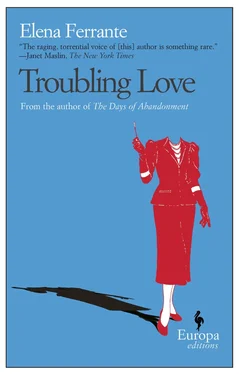Just a few months earlier (five, six?), on a sudden impulse, I had revealed to my mother, during one of my brief visits, that as an adolescent I used to retreat to that secret place, and I brought her up there, to the top. Maybe I wanted to try to establish an intimacy that there had never been, maybe I wanted to let her know in some confused way that I had always been unhappy. But she seemed to me only amused by the fact that I had sat suspended in the void, in a dilapidated elevator.
“Have you ever, in all these years, had a man?” I had then asked her, point-blank. I meant had she ever had a lover, after leaving my father? It was an anomalous question, among the possible questions between us since I was a child. But her body, seated a few inches from mine on the wooden bench, had manifested no unease. Not even her voice, which had been sure and clear: no. Not a single sign that might lead me to think that she was lying. Thus I had no doubt. She was lying.
“You have a lover,” I said to her coldly.
Her reaction had been exaggerated compared with her normal self-restraint. She had pulled her dress up to her waist, revealing baggy waist-high pink underpants. Giggling, she had said something confused about her soft flesh, her sagging belly, repeating, “Touch here,” and tried to take one of my hands to place it on her flabby white stomach.
I had pulled back and rested my hand on my heart to calm its rapid beating. She let fall the hem of her dress, but her knees were still uncovered, yellow in the light of the elevator. I regretted having brought her to my refuge. Above all I wanted her to cover herself. “Get out,” I had said to her. She had in fact done so: she never said no to me. A single step beyond the open doors and she had disappeared into darkness. Alone in the car, I had felt a peaceful pleasure. With an unreflecting gesture I had closed the doors. After a few seconds the light in the elevator went out.
“Delia,” my mother had murmured, but without alarm. She never showed alarm in my presence, and even on that occasion it had seemed to me that, out of long habit, instead of looking for reassurance, she intended to reassure me.
I had sat for a while tasting my name like an echo of memory, an abstraction that sounds without sound in one’s head. It seemed to me the voice, from time immemorial, of when she searched for me in the house and couldn’t find me.
Now I was there and trying to quickly cancel out the memory of that echo. But I still had the impression of not being alone. I was being spied on, not by that Amalia of months before who now was dead but by me coming out on the landing to see myself sitting there. I hated myself, when that happened. I was ashamed to discover myself mute in the obsolete car, suspended between void and darkness, hidden as if in a nest on the branch of a tree, with the long tail of the steel cables dangling wearily from the body of the elevator. I stretched out my hand toward the door and groped for the handle. The darkness withdrew beyond the arabesqued glass.
I had always known it. There was a line that I couldn’t cross when I thought of Amalia. Perhaps I was there in order to cross it. That frightened me. I pressed the button with the number 4 and the elevator jolted noisily. Creaking, it began to descend toward my mother’s apartment.
I asked for the keys from the neighbor, the widow De Riso. She gave them to me but refused definitively to go in with me. She was fat and suspicious, and had a big mole on her right cheek that was inhabited by two long gray whiskers. Her hair was parted in the middle and gathered at the back in a twist of braids. She was dressed in black: perhaps it was habitual, perhaps because she was still wearing her dress from the funeral. She stood on the threshold of her apartment and watched me choose the right keys. But the door hadn’t been carefully locked. Contrary to her usual habit, Amalia had used only one of the two locks, the one that took two turns of the key. The other, which took five, she hadn’t used.
“What’s happened?” I asked the neighbor, pushing open the door.
De Riso hesitated. “Her head was a little in the clouds,” she said, but she must have considered the expression disrespectful, because she added, “She was happy.” Then she hesitated again: it was clear that she would willingly have gossiped but she feared the ghost of my mother hovering over the stairwell, in the apartment, and certainly in her house as well. I invited her again to enter, hoping that she would keep me company with her chatter. She refused firmly, with a shudder, and her eyes filled with tears.
“Why was she happy?” I asked.
She hesitated again and then made up her mind.
“For some time a man had been coming to see her, a tall man, very respectable. . ”
I gave her a hostile glance. I decided that I didn’t want her to continue.
“He was her brother,” I said.
Signora De Riso narrowed her eyes, insulted: she and my mother had been friends for a long time and she knew perfectly well who Uncle Filippo was. He was neither tall nor very respectable.
“Her brother,” she pronounced with false compliance.
“No?” I asked, annoyed by her tone. She said goodbye to me coldly and closed the door.
When one enters the house of a person who has just died, it’s hard to believe that it’s deserted. Houses don’t have ghosts, but they contain the effects of life’s final gestures. First I heard the rush of water from the kitchen and for a fraction of a second, with an abrupt torsion of the true and the false, I thought that my mother wasn’t dead, that her death had been merely the subject of a long, painful fantasy that had begun in some long-ago time. I was sure that she was in the house, alive, standing at the sink, washing the dishes and murmuring to herself. But the shutters were closed, the apartment was dark. I turned on the light and saw that the water was streaming copiously into the empty sink from the old brass tap.
I turned it off. My mother belonged to a fading culture that could not conceive of waste. She wouldn’t throw away stale bread, she used the rind of the cheese, putting it in the soup to flavor it, she almost never bought meat but at the butcher asked for scrap bones to make broth, and then sucked on them as if they contained a miraculous substance. She would never have forgotten the tap. She used water with a frugality that was transformed into a reflex of gesture, ear, voice. If as a girl I left even a silent thread of water, extending to the bottom of the sink like a knitting needle, she would call to me an instant later, without reproach, “Delia, the tap.” I felt uneasy: she had wasted more water with that distraction in the last hours of life than in all her existence. I saw her floating face down, suspended in the middle of the kitchen, against the background of blue majolica tiles.
I moved on in a hurry. I went through the bedroom, throwing the few things she had cared about in a plastic bag: the album of family photographs, a bracelet, an old winter dress of hers from the fifties that I liked, too. The rest not even the junkmen would have wanted. The few pieces of furniture were old and ugly, her bed was only a mattress and box spring, the sheets and blankets had been mended with a care that, given their age, they didn’t deserve. It struck me, though, that the drawer where she usually kept her underwear was empty. I looked for the laundry bag and peered inside. There was nothing but a man’s shirt, of a good quality.
I examined it. It was a blue shirt, medium-sized, bought recently and chosen by a young man or a man of youthful tastes. The collar was dirty but the odor of the fabric was not unpleasant: the sweat was fused with an expensive brand of deodorant. I folded it carefully and put it in the plastic bag along with the other things. It was not a garment that Uncle Filippo would have worn.
Читать дальше












